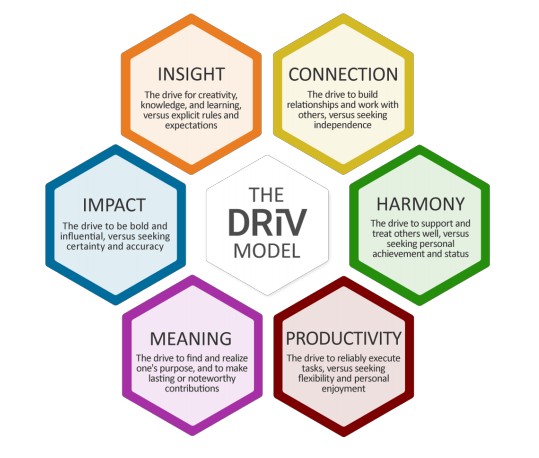What kind of movie is this?
I’m watching a pretty typical action movie in which the lead has been wronged in the opening scene, and she spends the rest of the movie chasing down the “bad guy” to issue her own—and through her, our—justice. Whether you’ve seen this movie or not, you’ve seen this story many times before. But while I’ve seen this kind of movie countless times, there will be a key fork in the narrative’s road ahead, and I don’t know the direction this particular story will turn. In the end, will the lead character catch and punish the “villain,” thus dolling out retribution and accountability, or will our hero turn toward forgiveness—making this a story of healing, growth, and relational and maybe even spiritual restoration? Is this a story of justice or grace? Whichever path this narrative takes, the degree to which I am likely to be satisfied by the ending depends on my motives and values—on what drives me. Am I more of a justice or grace kind of guy?
The DRiV
 The DRiV—a new assessment published by Leadership Worth Following (LWF) and trained by OKA, details 28 specific motives or drivers that underpin and influence our behavior. Grouped into six distinct motivational factors, these 28 drivers offers tremendous insight not only into our behavior—but why we make the choices we do. The DRiV lets us see—all of us, leaders, teams, and systems—the why behind the what.
The DRiV—a new assessment published by Leadership Worth Following (LWF) and trained by OKA, details 28 specific motives or drivers that underpin and influence our behavior. Grouped into six distinct motivational factors, these 28 drivers offers tremendous insight not only into our behavior—but why we make the choices we do. The DRiV lets us see—all of us, leaders, teams, and systems—the why behind the what.
 Forgiveness is one of these 28 drivers. The DRiV assessment defines Forgiveness as the drive to move past others’ mistakes, to avoid resentment, and to let go of offenses quickly and easily. OK, so what if I’m not driven toward Forgiveness? Low Forgiveness suggests that that I am driven to hold on to the past and to hold people to account. High Forgiveness is driven toward grace; low Forgiveness is driven toward justice.
Forgiveness is one of these 28 drivers. The DRiV assessment defines Forgiveness as the drive to move past others’ mistakes, to avoid resentment, and to let go of offenses quickly and easily. OK, so what if I’m not driven toward Forgiveness? Low Forgiveness suggests that that I am driven to hold on to the past and to hold people to account. High Forgiveness is driven toward grace; low Forgiveness is driven toward justice.
Forgiveness as a Scale
It is important NOT to see this construct as an either/or choice—as a dichotomy. It is not. You can have (and most of us do have) a blend of the two drivers. You sometimes are driven toward forgiveness, and then something happens or triggers you, and you are not. Consider how what drives you impacts the way you look and sound to the people around you.
| If you forgive people less than others around you, you may be regarded as: | If you forgive people more than others around you, you may be regarded as: |
| · Justice-focused
· Accountability-oriented · Unforgiving, vengeful and/or vindictive · Backward-looking—stuck in the past · Stern, angry and/or mired in resentment |
· Forgiving
· Compassionate & harmonious · Soft & weak-willed—lacking in fortitude · Blind to justice · Overly personal & sensitive |
How do you want your movies to end?
Do you drive more consistently toward forgiveness or accountability—toward grace or justice, or does it depend on the time, place and circumstances? This insight and the 27 others within this new assessment make up a compelling new self-awareness profile and a unique new personal and team toolkit.
Meet the DRiV

In 2021, OKA is taking on this powerful and flexible new tool. With a new OKA-authored workbook and interpretation guide, and both a new interactive DRiV Introduction workshop and certification class, we at OKA are excited to have the DRiV join our bench of tools providing great new insights to anyone—individuals, leaders, teams, and organizations.

Leave a Comment